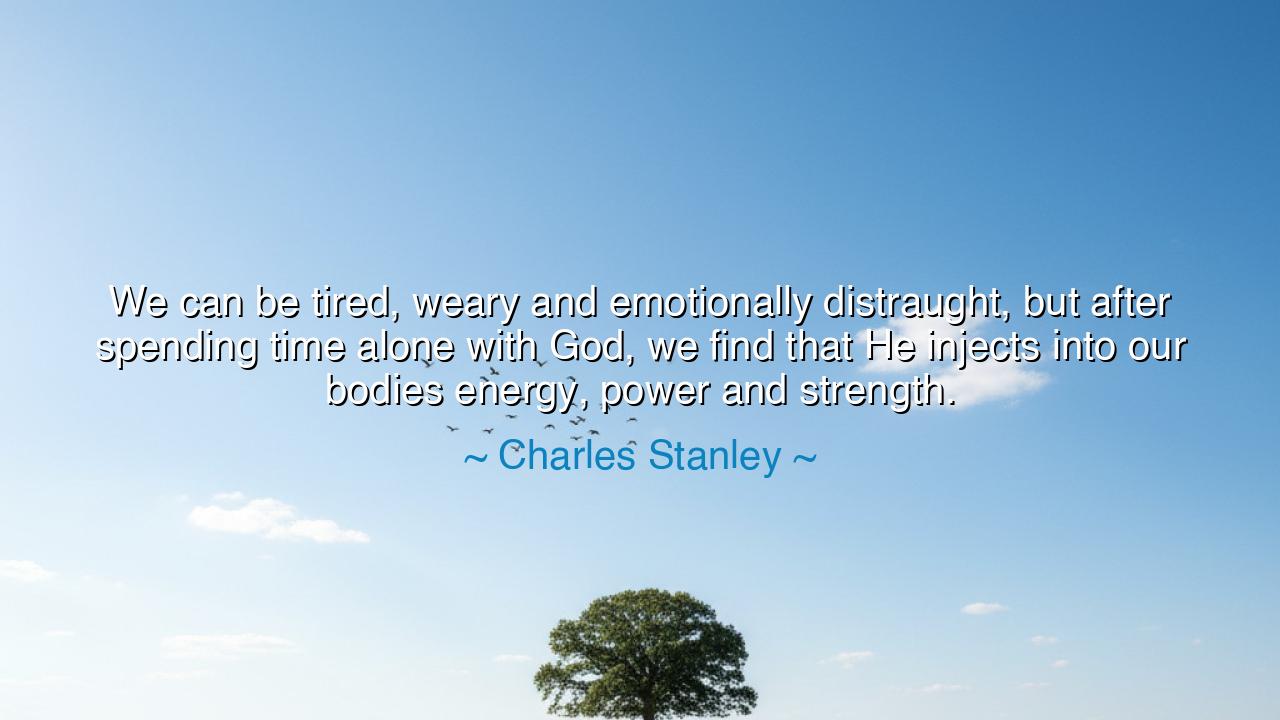
We can be tired, weary and emotionally distraught, but after
We can be tired, weary and emotionally distraught, but after spending time alone with God, we find that He injects into our bodies energy, power and strength.






In the wise and comforting words of Charles Stanley, the shepherd of weary souls, we find a truth that resounds through the ages: “We can be tired, weary and emotionally distraught, but after spending time alone with God, we find that He injects into our bodies energy, power and strength.” These words are not merely spiritual poetry—they are the living echo of divine experience, spoken by one who has walked through both the silence of despair and the renewal of grace. Stanley, a pastor and teacher of unshakable faith, understood that human endurance has limits, but God’s presence renews what exhaustion drains. When the body fails and the mind trembles, the spirit sustained by communion with God rises again, stronger and steadier than before.
Charles Stanley, who served as a preacher for decades and guided millions through his sermons, spoke often of the intimate relationship between the soul and its Creator. He lived through trials—seasons of discouragement, betrayal, and hardship—and in those seasons, he discovered that the secret of strength was not in striving, but in surrender. His words were born not from theory, but from the crucible of experience. To him, solitude with God was not withdrawal from the world—it was replenishment for re-entering it. He taught that prayer was not a ritual to appease, but a communion to restore, that in the stillness of faith, divine energy begins to flow again through the weary veins of the human heart.
When Stanley says that “He injects into our bodies energy, power and strength,” he speaks in the language of life itself. For faith, when alive and personal, is not merely an idea—it becomes a force, a current that moves through the whole being. It revives the broken mind, strengthens the trembling hands, and kindles again the fire that suffering has smothered. The ancient prophet Isaiah once declared the same truth: “They that wait upon the Lord shall renew their strength; they shall mount up with wings as eagles.” It is not effort that grants the eagle flight—it is the wind beneath its wings. So too, the believer’s strength is not his own—it is the breath of God lifting him from despair to endurance.
This truth finds its reflection throughout history. Consider the story of David Livingstone, the great missionary-explorer of Africa. Alone in the wilderness, ravaged by illness, far from any human comfort, he wrote in his journal that though his body was frail and his heart weary, he felt sustained by the nearness of God. “I am immortal,” he wrote, “till my work is done.” His strength was not of the flesh but of the spirit. What sustained him through loneliness, danger, and disease was the same divine current that Charles Stanley describes—the unexplainable power that flows from communion with the Creator, transforming human weakness into divine perseverance.
There is a mystery in this renewal that defies human reasoning. The world teaches us to rest by retreating, to recover through pleasure or sleep. But spiritual restoration works in reverse—it fills us not by escape, but by encounter. When a soul enters the quiet of prayer, it steps into the eternal rhythm of God Himself. The chaos of the world falls away, the burdens of the heart dissolve, and what remains is the still, steady pulse of divine love. In that sacred silence, one begins to feel the renewal of life, as though the very essence of the universe breathes into weary lungs. It is not imagination—it is resurrection in miniature.
Stanley’s teaching reminds us that solitude with God is not emptiness but empowerment. The world may call it idleness, but the wise know it as preparation. Every great soul who has changed the world has first found power in stillness: Moses in the desert, Jesus in the wilderness, Paul in his prison cell. They emerged not broken by isolation, but strengthened by it. In their solitude, they met the One who alone can pour vitality into the frail vessel of man. And when they returned, they carried within them a strength that no circumstance could diminish.
The lesson, then, is both timeless and personal: when you are weary, do not seek first the comfort of the world—seek the presence of God. Do not fear the silence, for it is in silence that His voice is heard. When your strength fails, lay it at His feet, and He will replace it with His own. Make time each day to withdraw from the noise—to pray, to meditate, to simply be still in His presence. For every moment spent with God is a moment in which your soul is refilled with divine energy.
So remember this, O traveler burdened by the weight of life: your strength is not lost—it is waiting to be renewed. As Charles Stanley reminds us, the weariness of the flesh and the anguish of the heart are no match for the power that flows from communion with the Eternal. Go, then, into the quiet, and there, beneath the gaze of your Creator, you will find what no sleep, no drink, no medicine can give—the strength of the Spirit, the peace that surpasses understanding, and the inexhaustible energy of a heart sustained by God Himself.






AAdministratorAdministrator
Welcome, honored guests. Please leave a comment, we will respond soon